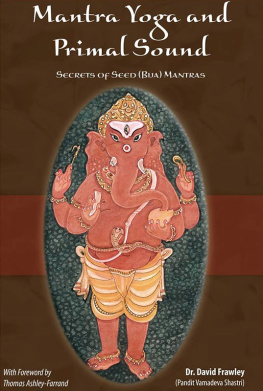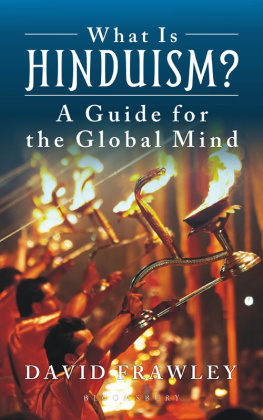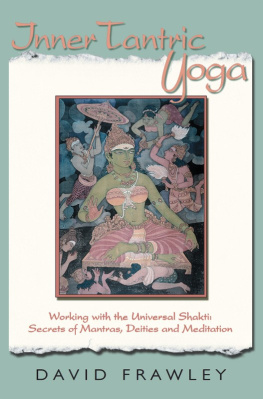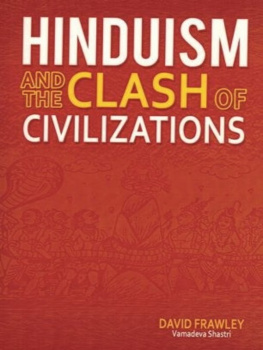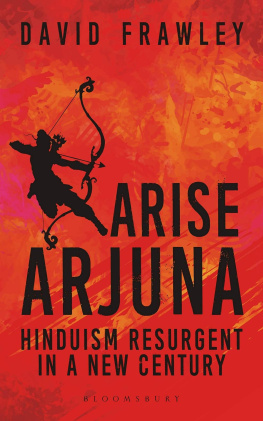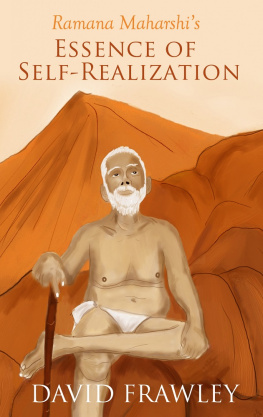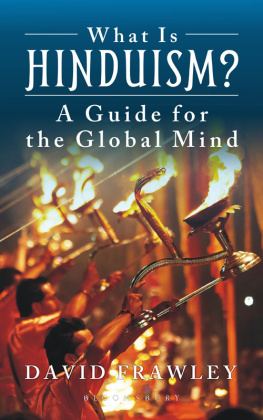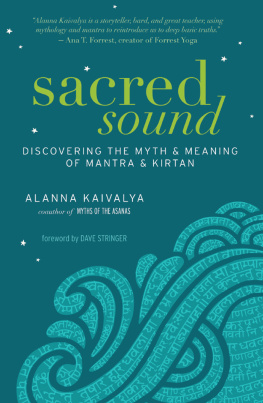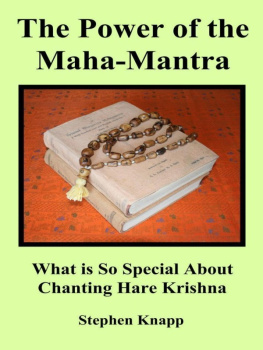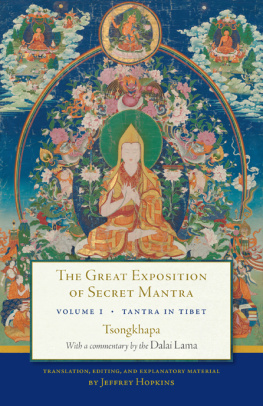David Frawley - Mantra Yoga and the Primal Sound
Here you can read online David Frawley - Mantra Yoga and the Primal Sound full text of the book (entire story) in english for free. Download pdf and epub, get meaning, cover and reviews about this ebook. year: 2012, publisher: Lotus Press, genre: Religion. Description of the work, (preface) as well as reviews are available. Best literature library LitArk.com created for fans of good reading and offers a wide selection of genres:
Romance novel
Science fiction
Adventure
Detective
Science
History
Home and family
Prose
Art
Politics
Computer
Non-fiction
Religion
Business
Children
Humor
Choose a favorite category and find really read worthwhile books. Enjoy immersion in the world of imagination, feel the emotions of the characters or learn something new for yourself, make an fascinating discovery.
- Book:Mantra Yoga and the Primal Sound
- Author:
- Publisher:Lotus Press
- Genre:
- Year:2012
- Rating:3 / 5
- Favourites:Add to favourites
- Your mark:
- 60
- 1
- 2
- 3
- 4
- 5
Mantra Yoga and the Primal Sound: summary, description and annotation
We offer to read an annotation, description, summary or preface (depends on what the author of the book "Mantra Yoga and the Primal Sound" wrote himself). If you haven't found the necessary information about the book — write in the comments, we will try to find it.
Mantra Yoga and the Primal Sound — read online for free the complete book (whole text) full work
Below is the text of the book, divided by pages. System saving the place of the last page read, allows you to conveniently read the book "Mantra Yoga and the Primal Sound" online for free, without having to search again every time where you left off. Put a bookmark, and you can go to the page where you finished reading at any time.
Font size:
Interval:
Bookmark:

By
Dr. David Frawley
(Pandit Vamadeva Shastri)
Table of Contents
This book is not intended to treat, diagnose or prescribe. The information contained herein is in no way to be considered as a substitute for a consultation with a duly licensed health care professional.
ALL RIGHTS RESERVED. No part of this book may be reproduced in any form or by any electronic or mechanical means including information storage and retrieval systems without permission in writing from the publisher, except by a reviewer who may quote brief passages in a review.
Author: Dr. David Frawley
Copyright 2010 by Dr. David Frawley
Illustrations: Cover and drawings/ pictures - Hinduism Today, additional line drawings of Goddesses - Kanika Tripathi
First Edition 2010
Printed in the United States of America
ISBN: 978-1-6086-9113-5
Library of Congress Catalog Number:2010921035
Published by:
Lotus Press, P.O. Box 325, Twin Lakes, WI 53181 USA
web: www.lotuspress.com
Email: lotuspress@lotuspress.com
800.824.6396
Dr. David Frawley, Pandit Vamadeva Shastri, is a modern Renaissance man for Eastern mystical studies.
If one is interested in Vedic Astrology, he has insightful books filled with information and wisdom about this ancient science.
If one is drawn to the ancient science of healing called Ayurveda, again David Frawley has books that will illumine the subject for you and guide you to further reading and studies.
If your interests lie in the area of classical tantric practices and I dont mean of the sexual variety, but of the true mystical approaches then you again will do well to consult the books expertly rendered by David Frawley.
But his reach is yet greater. In India he is recognized as an historian of modern importance. He coauthored Hidden Horizons Unearthing 10,000 Years of Indian Culture, which has been publicly lauded by many Jagadgurus and spiritual leaders in India.
So it is with appreciation for his stellar contributions to Hindu mystical practice, history and thought that I approach this Foreword to yet another great contribution from him: The topic of Sanskrit Mantra.
Classical descriptions of mantra are grounded in the idea that this entire creation at both the manifest and subtle levels is nearly endless combinations of the finite vibrations that scholars and mystics alike call the Matrika The Mother: The Sanskrit alphabet. Whether it is Satya Loka, the realm of pure Truth at the top of the realms of light, or Patala Loka, the lowest of the seven nether realms, the composition of these lokas and the beings of form that inhabit them are composed of various permutations and combinations of the Matrika: The Sanskrit Alphabet. In various mystical texts the Matrika is commonly referred to as She who binds and She who sets free.
If we are unaware of the existence, power and operation of the Matrika, we are inexorably bound to the wheel of death and rebirth Samsara. We are in the thrall of She who binds. But if we understand, even if only a little, and practice ancient spiritual formulas called mantras, we enter the realm of She who sets us free. Mantra is often referred to as The Divine Name, called Nama in Sanskrit. If one goes to any Hindu Temple and approaches one of the priests and says questioningly, Nama Eva, Nama Eva... there will invariably come the response, Kevalam, Kevalam. This exchange roughly translates as, The Name alone, the Name alone... sets one free, sets one free. The understanding between the questioner and responder is that the practice of Sanskrit mantra is the single most efficacious spiritual practice for the current period of Spiritual Winter, called Kali Yuga.
In the last fifty years, Masters such as my own gurus, Sadguru Sant Keshavadas and his wife Sadguru Rama Mata, have both taught extensively and encouraged others like me to spread this knowledge of mantra and make it available to everyone. With his works such as Inner Tantric Yoga and this book, David Frawley lends his authoritative voice to the authentic and reliable resources available to help all of us escape our karmic predicaments.
Dr. Frawley goes into considerable helpful exposition on the subject of mantra. As a preamble to his discussion, here is some beginning explanation of the subject of mantra from my book, The Ancient Power of Sanskrit Mantra and Ceremony, Volume I. The word mantra has entered colloquial speech much the same way guru has. Advertising slogans become mantras for products or services. Political campaigns develop popular mantras for convincing voters about platform policies or candidates for office. Yet the true genesis and meaning of the term has become swallowed by popular usage along with a commonly agreed upon definition which does not come close to the original meaning for the word.
For some words, a distinction between what a word truly means and what is generally accepted as the meaning has little importance. But for a word like mantra, the true meaning is important. This is because a mantra is a word or term of power. And the power of every mantra is specific and exact. Therefore, popularly accepted definitions of what mantra is may have no relevance whatsoever to the actual use and effect of the power of a specific Sanskrit mantra.
With this understanding of mantra as an expression of tangible and usable power, we have the first useful item in the application of the science of mantra. Mantras are tools of power and tools for power. They are formidable. They are ancient. They work.
The word mantra is derived from two Sanskrit words. The first is manas or mind, which provides the man syllable. The second syllable is drawn from the Sanskrit word trai meaning to protect or to free from. Therefore, the word mantra in its most literal sense means to free from the mind (the cognitive, creative mind). Mantra is, at its core, a tool used by the mind that eventually frees one from the vagaries of the mind. But the journey from mantra to freedom is a wondrous one. The mind expands, deepens and widens and eventually dips into the essence of cosmic existence. On its journey, the mind comes to understand much about the essence of the vibration of things. And knowledge, as we all know, is power. In the case of mantra, this power is tangible and wieldable.
The historical derivation of the science and study of mantras corresponds with the intricacies of the Sanskrit language. Sanskrit has been called a variety of names: Deva Lingua (language of the gods), the mother of tongues, or simply a divine language. Why should this be?
Linguists commonly ascribe these descriptions to Sanskrit, because it provides a root tongue for so many languages, but the real reason is more esoteric. The Sanskrit alphabet has the same number of petals or spokes as there are on the flowers or wheels of the total of the first six chakras or esoteric energy centers, located along the spine. This is no accident.
The Sanskrit language is a tool for working with the subtle energy potential represented by each of the many chakras in the etheric body. However, the six major chakras contain the map of sounds written on each of the combined petals on those six chakras.
A saying from the Vedas claims that, Speech is the essence of humanity. All of what humanity thinks and ultimately becomes is determined by the expression of ideas and actions through speech and its derivative, writing.
Everything comes into being through speech. Ideas remain unactualized until they are created through the power of speech. The New Testament, Book of John, starts: In the beginning was The Word. And the Word was with God and the Word was God...
Next pageFont size:
Interval:
Bookmark:
Similar books «Mantra Yoga and the Primal Sound»
Look at similar books to Mantra Yoga and the Primal Sound. We have selected literature similar in name and meaning in the hope of providing readers with more options to find new, interesting, not yet read works.
Discussion, reviews of the book Mantra Yoga and the Primal Sound and just readers' own opinions. Leave your comments, write what you think about the work, its meaning or the main characters. Specify what exactly you liked and what you didn't like, and why you think so.

